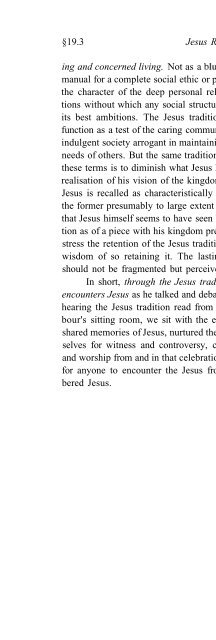Jesus Remembered: Christianity in the Making, vol. 1
Jesus Remembered: Christianity in the Making, vol. 1 Jesus Remembered: Christianity in the Making, vol. 1
§19.3 Jesus Remembered ing and concerned living. Not as a blueprint for such a life, nor as an instruction manual for a complete social ethic or politically mature society. But as indicating the character of the deep personal relations and priorities, values, and motivations without which any social structure or political manifesto will fail to realise its best ambitions. The Jesus tradition heard responsively could and can still function as a test of the caring community, as a rebuke and challenge to any selfindulgent society arrogant in maintaining its own prerogatives and careless of the needs of others. But the same tradition shows that to hear Jesus speaking only in these terms is to diminish what Jesus himself stood for and to lose the key to the realisation of his vision of the kingdom. For, once again, we need to stress that Jesus is recalled as characteristically linking love of neighbour to love of God, the former presumably to large extent dependent on the latter. We need to stress that Jesus himself seems to have seen his expected death and hoped-for resurrection as of a piece with his kingdom preaching and living. And, again, we need to stress the retention of the Jesus tradition only within the Gospel format, and the wisdom of so retaining it. The lasting impact of Jesus in the Jesus tradition should not be fragmented but perceived afresh in its wholeness. In short, through the Jesus tradition the would-be disciple still hears and encounters Jesus as he talked and debated, shared table-fellowship and healed. In hearing the Jesus tradition read from pulpit or stage, in sacred space or neighbour's sitting room, we sit with the earliest disciple and church groups as they shared memories of Jesus, nurtured their identity as his disciples, equipped themselves for witness and controversy, celebrated and learnt fresh lessons for life and worship from and in that celebration. Through that tradition it is still possible for anyone to encounter the Jesus from whom Christianity stems, the remembered Jesus. 893
- Page 1774: §18.5 Et Resurrexit regarding thei
- Page 1778: §18.5 EtResurrexit (i) One of the
- Page 1782: §18.5 Et Resurrexit Paul believed
- Page 1786: §18.5 Et Re surr exit saw was give
- Page 1790: §18.5 Et Resurrexit interpretation
- Page 1794: §18.6 Et Resurrexit tween event, d
- Page 1798: §18.6 Et Resurrexit move any idea
- Page 1804: THE CLIMAX OF JESUS' MISSION §19.1
- Page 1808: THE CLIMAX OF JESUS' MISSION §19.2
- Page 1812: THE CLIMAX OF JESUS' MISSION §19.2
- Page 1816: THE CLIMAX OF JESUS' MISSION §19.2
- Page 1820: THE CLIMAX OF JESUS' MISSION §19.3
- Page 1824: THE CLIMAX OF JESUS' MISSION §19.3
- Page 1832: ABBREVIATIONS BDB F. Brown, S. R. D
- Page 1836: ABBREVIATIONS JJS Journal of Jewish
- Page 1840: ABBREVIATIONS ST Studia Theologica
- Page 1844: BIBLIOGRAPHY . The End of the Ages
- Page 1848: BIBLIOGRAPHY Barth, K. From Roussea
- Page 1852: BIBLIOGRAPHY Borg, M. J. Conflict,
- Page 1856: BIBLIOGRAPHY Cameron, R. The Other
- Page 1860: BIBLIOGRAPHY . Studying the Histori
- Page 1864: BIBLIOGRAPHY Dawes, G. W., ed. The
- Page 1868: BIBLIOGRAPHY . Jesus' Call to Disci
- Page 1872: BIBLIOGRAPHY . Jesus and His Contem
§19.3 <strong>Jesus</strong> <strong>Remembered</strong><br />
<strong>in</strong>g and concerned liv<strong>in</strong>g. Not as a bluepr<strong>in</strong>t for such a life, nor as an <strong>in</strong>struction<br />
manual for a complete social ethic or politically mature society. But as <strong>in</strong>dicat<strong>in</strong>g<br />
<strong>the</strong> character of <strong>the</strong> deep personal relations and priorities, values, and motivations<br />
without which any social structure or political manifesto will fail to realise<br />
its best ambitions. The <strong>Jesus</strong> tradition heard responsively could and can still<br />
function as a test of <strong>the</strong> car<strong>in</strong>g community, as a rebuke and challenge to any self<strong>in</strong>dulgent<br />
society arrogant <strong>in</strong> ma<strong>in</strong>ta<strong>in</strong><strong>in</strong>g its own prerogatives and careless of <strong>the</strong><br />
needs of o<strong>the</strong>rs. But <strong>the</strong> same tradition shows that to hear <strong>Jesus</strong> speak<strong>in</strong>g only <strong>in</strong><br />
<strong>the</strong>se terms is to dim<strong>in</strong>ish what <strong>Jesus</strong> himself stood for and to lose <strong>the</strong> key to <strong>the</strong><br />
realisation of his vision of <strong>the</strong> k<strong>in</strong>gdom. For, once aga<strong>in</strong>, we need to stress that<br />
<strong>Jesus</strong> is recalled as characteristically l<strong>in</strong>k<strong>in</strong>g love of neighbour to love of God,<br />
<strong>the</strong> former presumably to large extent dependent on <strong>the</strong> latter. We need to stress<br />
that <strong>Jesus</strong> himself seems to have seen his expected death and hoped-for resurrection<br />
as of a piece with his k<strong>in</strong>gdom preach<strong>in</strong>g and liv<strong>in</strong>g. And, aga<strong>in</strong>, we need to<br />
stress <strong>the</strong> retention of <strong>the</strong> <strong>Jesus</strong> tradition only with<strong>in</strong> <strong>the</strong> Gospel format, and <strong>the</strong><br />
wisdom of so reta<strong>in</strong><strong>in</strong>g it. The last<strong>in</strong>g impact of <strong>Jesus</strong> <strong>in</strong> <strong>the</strong> <strong>Jesus</strong> tradition<br />
should not be fragmented but perceived afresh <strong>in</strong> its wholeness.<br />
In short, through <strong>the</strong> <strong>Jesus</strong> tradition <strong>the</strong> would-be disciple still hears and<br />
encounters <strong>Jesus</strong> as he talked and debated, shared table-fellowship and healed. In<br />
hear<strong>in</strong>g <strong>the</strong> <strong>Jesus</strong> tradition read from pulpit or stage, <strong>in</strong> sacred space or neighbour's<br />
sitt<strong>in</strong>g room, we sit with <strong>the</strong> earliest disciple and church groups as <strong>the</strong>y<br />
shared memories of <strong>Jesus</strong>, nurtured <strong>the</strong>ir identity as his disciples, equipped <strong>the</strong>mselves<br />
for witness and controversy, celebrated and learnt fresh lessons for life<br />
and worship from and <strong>in</strong> that celebration. Through that tradition it is still possible<br />
for anyone to encounter <strong>the</strong> <strong>Jesus</strong> from whom <strong>Christianity</strong> stems, <strong>the</strong> remembered<br />
<strong>Jesus</strong>.<br />
893



